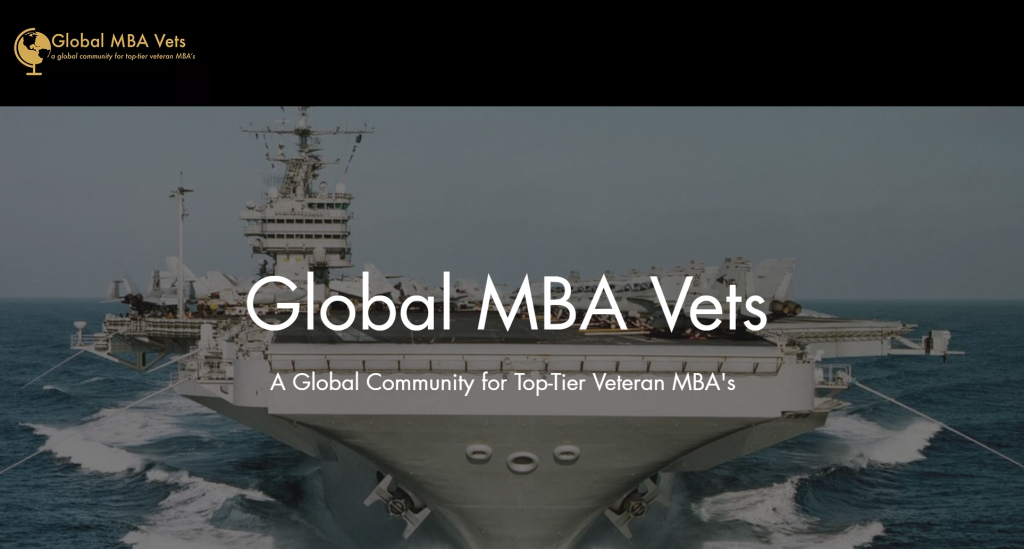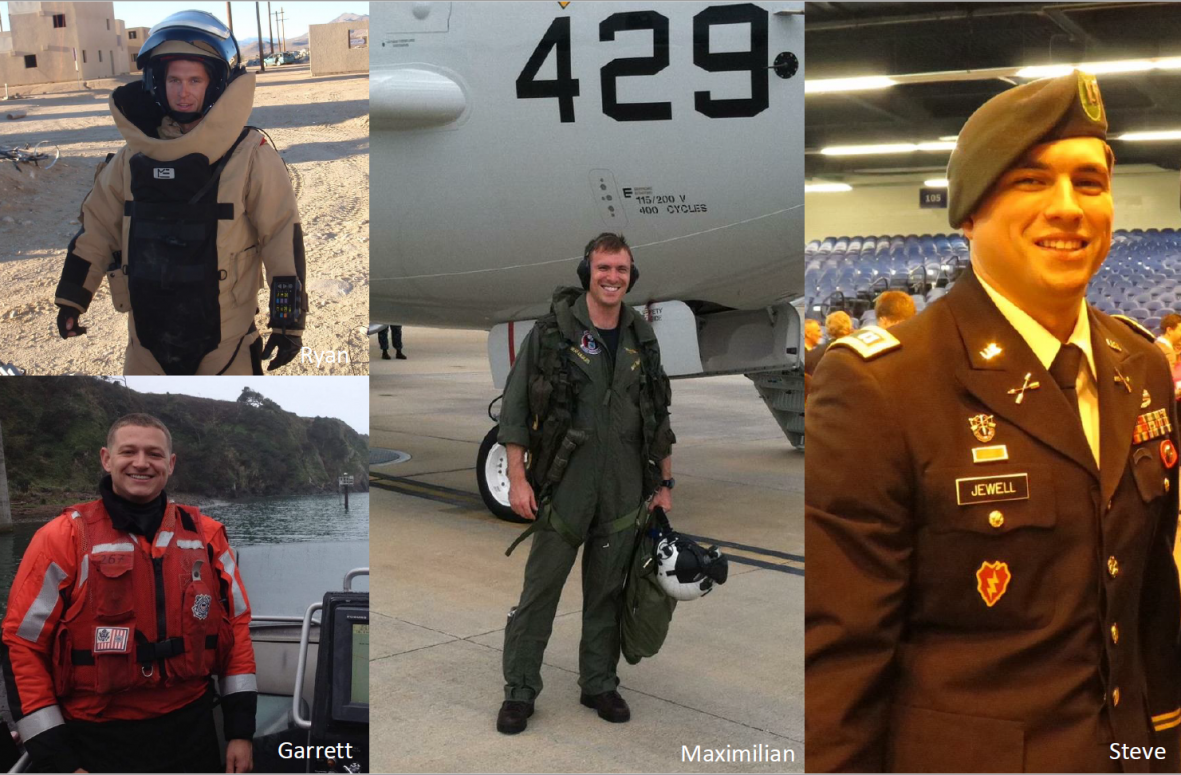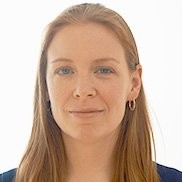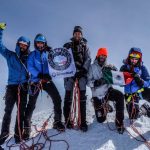Veterans have always found a good home at IESE, in fact our MBA class of 2020 has the most American veterans of any class in IESE’s history. To support his classmates and other vets around the world, Ryan Fritsch, MBA Class of 2019 has also recently launch the website Global MBA Vets to help create a global community for veterans at top-tier MBA programs.
Given their unique perspective, we asked four of our current students with military backgrounds about their experience, why they chose to pursue their MBA at IESE and what advice they would have for other veterans facing a similar decision. Here is what they have to say:
What was your background before the MBA?
Ryan Fritsch, MBA Class of 2019 – I was an Explosive Ordnance Disposal Technician (EOD) for nearly 10 years in the US Navy. EOD Techs are the bomb defusal experts in the military, with Navy EOD having further expertise in underwater explosive devices. I worked both in Asia and the Middle East during my time, and finished my military career as an instructor at the US EOD school. There we train US and partner forces from nearly 100 different countries in bomb defusal and disposal procedures.
Maximilian Mayer, MBA Class of 2020 – I was a Navy pilot and flew maritime patrol aircraft (more specifically the P-3C Orion and the P-8A Poseidon) in Patrol Squadron Sixteen. I was deployed to Central America, Europe and Japan. I also completed one staff assignment at the Pentagon and one overseas tour in Bahrain, where among other things I served as division officer of the base harbor patrol security unit.
Steven Jewell, MBA Class of 2020 – Prior to starting the MBA, I served as an officer in the U.S. Army for 10 years. I started my Army career as an Artillery officer stationed in Hawaii, I deployed to Afghanistan, and eventually was selected for and transitioned to the U.S. Army Special Forces, where I completed my last five years as a “Green Beret” Captain.
Garrett Henderson, MBA Class of 2020 – I started my career in public accounting and spend three years as a financial statement auditor with Ernst & Young. During that time, I had the opportunity to work on a Fortune 500 pharmaceutical client and travel internationally on multiple occasions to perform site audits. After EY, I decided to make a bit of a change and enlisted in the United States Coast Guard. I spent my first three years serving on the Coast Guard Cutter Eagle, a 295-foot square rigged sailing vessel used to train future officers. After completion of that tour I transferred to Station Golden Gate, the busiest search and rescue station in the Coast Guard, where I led search and rescue responses in the San Francisco Bay Area.
Why did you decide to go to IESE?
Max – I wanted to attend a top MBA program either in the U.S. or in Europe. IESE was my number one choice because of its reputation, the second to none location, access to leading companies and consulting firms in the EU, and the great things I had heard from a current student and fellow veterans. Ultimately what sealed my decision was Admitted Students Weekend in Barcelona when I met some of my future classmates – people that were incredibly diverse, fun, intelligent, open minded and fascinating.
Steve – When evaluating the options that I had with the G.I. Bill, I knew that I had a great opportunity to go to one of the many top programs in the US. However, after I found out that the G.I. Bill compensated foreign schools similar to the programs in the U.S. I expanded my search to the European programs. I separated from the Army in Germany and I loved my time in Europe. I decided to apply only to IESE because of the school’s two-year program (similar to the US model), their close relationship/history with Harvard Business School, the case-method approach, the school’s rising reputation, and of course the city of Barcelona.
Garrett – There were a few things that set IESE apart for me. The first was the opportunity to spend two years among such an incredibly diverse student body. We currently have over 55 countries represented in our class, and it has been an absolute privilege to learn from individuals from all over the world with backgrounds in so many fields. Second, I really wanted to do a two-year program, as I had been out of the business world for almost seven years. Finally, I visited the school before I applied, and immediately fell in love with IESE. The admissions staff was incredibly helpful, the class that I sat in on was really engaging, and the campus is beautiful. I attended the Admitted Students Weekend the following year and my decision was confirmed 100%.
What has surprised you the most about your IESE experience?
Ryan – The international make up and diversity student body. For example, my nine person team in my first year had eight different nationalities from all different professional backgrounds. When you are discussing cases, the different perspectives provide a really interesting dialogue. The diversity not only helps with great solutions in the short-term, but really helped me develop as a better communicator and problem-solver for my future working internationally.
Steve – Despite the class sizes of 70 people per section and five sections overall, I am truly impressed by the instructors at IESE who knew our names and backgrounds from the very first day. It was clear that the professors read our resumes and could identify what students were going to say after only a few classes. It was quite obvious that they knew by choosing a person in class they could steer the discussion in a direction that they wanted based on the personalities and backgrounds within the section.
Garrett – While many second year and former students had told me that the IESE program was intense, I had initially felt that they might be exaggerating a bit. Turns out that I was wrong. The first term is absolutely packed, from course preparation, group projects, case competitions, business Spanish, club events, career preparation, and of course all the social events. It’s not that any individual class or event is overly demanding, but trying to manage everything at once is definitely a challenge. Over time, however, the work load doesn’t necessarily decrease, but I have found that I have significantly improved my ability to manage my time and tasks.
How did you adjust from the military to the MBA classroom environment?
Ryan – Veterans will have a natural advantage in certain classes, such as leadership, because of their experience, while most vets may have little-to-no previous experience in certain classes on other topics. With that in mind, it is important to leverage the skills and backgrounds of your classmates. Teamwork was a key aspect of my first year at the school and if you do not utilize the talent and diversity of your teams you will not grow as much as you could, both personally and professional.
Max – For me the cultural adjustment was an easy and welcoming one. My most challenging adjustment was refamiliarizing myself with the academic environment, given that I graduated from undergrad over ten years ago. IESE has a scholastically challenging and very intense program. The best way to adjust and succeed for me has been to learn from my classmates and leverage each other’s strengths. Someone from my team or in my section is always there to help and I’ve already learned so much from them.
Steve – The hardest part about making the transition has been to let go of my position as an officer in the Special Forces. To me, that was ingrained in my personality and has truly molded how I carry myself. Also, not having some of the entitlements of being a military member while living in Europe was quite the change. Make sure you reach out to people who have gone through the transition prior to you, use him/her as your sponsor, and don’t be afraid to ask for support.
Garrett – The biggest change for me has been trying to get used to sitting so much throughout the day. During my time in the Coast Guard I was always up and moving during the workday, and now it feels like I’m spending all day sitting down. During the next term I am really trying to set a goal to exercise more consistently to counteract a lot of the physical inactivity.

The website and community set up by Ryan Fritsch to connect and support other MBA vets.
What do you want to do after the MBA and what resources have you taken advantage of (both on campus and otherwise) in your career search?
Ryan – I already have secured my post-MBA employment. I interned at AB InBev in Belgium over the summer as part of their Global MBA Program and received a full-time offer. I will be relocating to Belgium and working as part of the Business Unit for Belgium, Germany, and Luxembourg. I am excited to be a part of their GMBA program, as I can leverage the skills I acquired in business school and also take advantage of the leadership skills I acquired during my time in the military. I came into IESE with AB InBev as my target company and I couldn’t be happier to be working there post-MBA.
In regards to how my job search went, I wasn’t sure how enticing my military background would be to companies outside of the U.S. as compared to the companies in the U.S. However, I was met with considerable enthusiasm reaching out to large multinationals, such as AB InBev, as well as traditional MBA sectors like consulting. Many of these companies have veteran MBAs working in their US offices and have heard great things from their American counterparts about the work we do. Additionally, I found that networking with veterans regardless of where they pursued their MBA was one of the most helpful ways to gain insight into a company and get my foot in the door for a potential interview. There is considerable demand for military MBAs abroad and networking with other veterans was the best way to find these opportunities, in my experience.
Max – Right now I am undergoing the recruiting process for strategy consulting and also pursuing several opportunities at multinational companies in Europe. My father is German, I grew up speaking the language, and I wish to reconnect with my roots and remain in the EU post-MBA. The Consulting Club has been incredibly helpful and the professionalism and time they put into making sure we’re prepared has really impressed me.
Steve – Currently, I am seeking opportunities in the Management Consulting sector for some of the top firms in the world in the U.S. and in Europe. I secured six consulting firm interviews and I hope to be selected for one of the most reputable firms. I had an idea that consulting was something that I could be interested in based on my past experience and I used the consulting club and the IESE Career Forum to get an idea of what it is like to work in one of those firms on a daily basis. Prior to the application process, I relied heavily on my own network and some of the second-year students’ network of veterans working in consulting firms to introduce myself into certain offices in the U.S. Due to the school’s geographic location, networking to offices in the U.S. is not exactly streamlined and I had to make an extra effort to communicate with the offices in the U.S. to ensure they knew my name prior to submitting applications.
What advice to you have for other veterans interested in pursuing an MBA?
Ryan – An MBA is a great choice for anyone exiting the military and wanting to transition into business, and IESE is particularly beneficial for those wanting an international experience. As far as advice, the best way to get to know a school as a prospective student is to talk to current MBA students. The veteran MBA network is very receptive to helping other vets, so if you are interested in a particular school, try and connect to a current military student. I am always happy to chat with a fellow vet regarding my experiences at IESE.
Max – If you are interested in making a career change, expanding your network, and spending some unforgettable times with incredible people, do it. Make sure you speak with other students and veterans at the school and visit if you can to get a better understanding of the campus culture, student body, and class format. In the end, it’s really about what feels right.
Steve – If you are going to invest your time and money into an MBA program, ensure you target top-ranked schools. My understanding is that when it comes time to submit job applications there is a world of difference between going to a top-ranked program and a school that is not top-ranked. Some firms will not even consider you if you are not from a “Target School.” Having the background of a veteran carries a lot of weight alone, however combining that with a strong school’s reputation makes you highly attractive to companies globally.
Garrett – The important piece of advice that I can give is to reach out and connect to veterans at the MBA programs and companies that you are interested in. I have found overwhelming support and received invaluable information and advice from veterans both in top MBA programs as well as top organizations. Leverage the network early and you’ll be surprised at the help you receive. One practical way to do this is to sign up for a LinkedIn premium account, which is free for one year for veterans and active duty members. This will help you to find veterans in each MBA program or company that you are interested in.
If you have any questions Ryan, Max, Steve and Garrett are happy to talk about their experience:
• Ryan Fritsch, Ryan.Fritsch@iese.net
• Maximilian Mayer, Maximilian.Mayer@iese.net
• Steven Jewell, Steven.Jewell@iese.net
• Garrett Henderson, Garrett.Henderson@iese.net
Thank you to our students for sharing their thoughts!
Pursue your dream MBA! Take these next steps today:







Good to get the update on all of you! Best of luck with the internship/job hunt.
-Thad
In veteran’s perspective, the blog is nice and informative.